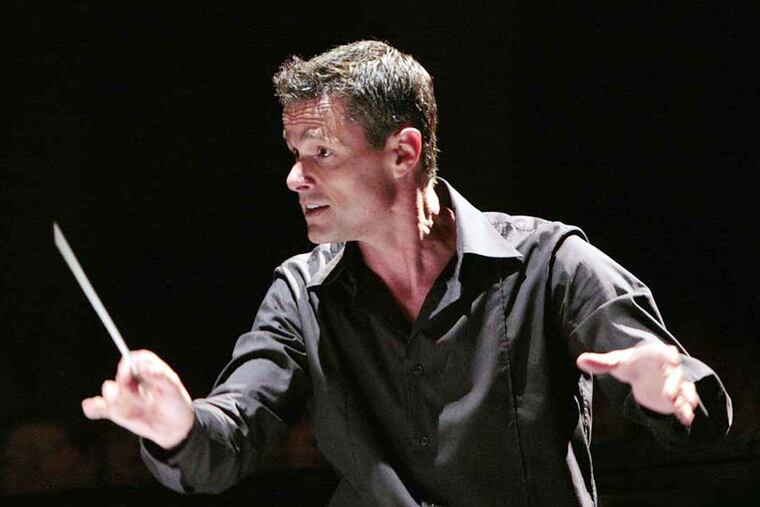Talking Christmas music with David Charles Abell
Conductor David Charles Abell is far too urbane to be a musical Santa Claus at the Philly Pops Christmas Spectacular, now running at the Kimmel Center. But pops, classical, and theater music are all of a piece in the life of this 56-year-old conductor who grew up in Mount Airy, graduated from Germantown Friends School ('76), studied with Leonard Bernstein, and is based in London, where he conducts an array of concerts and West End shows.

Conductor David Charles Abell is far too urbane to be a musical Santa Claus at the Philly Pops Christmas Spectacular, now running at the Kimmel Center. But pops, classical, and theater music are all of a piece in the life of this 56-year-old conductor who grew up in Mount Airy, graduated from Germantown Friends School ('76), studied with Leonard Bernstein, and is based in London, where he conducts an array of concerts and West End shows.
Q: Christmas concerts can be so many things to so many people. How do you choose, sequence, and pace the material?
It needs to flow with peaks and valleys not unlike a musical. . . . With Philly Pops, we have . . . a 70-piece orchestra (with a crack swing band hidden inside), the 140-voice Festival Chorus, the Philadelphia Boys Choir, the St. Thomas Gospel Choir, Peter Richard Conte on organ, and Broadway soloist Hugh Panaro. That's a lot of moving parts. Each needs its own special moment.
Last year, I told corny holiday jokes . . . and by the end was receiving notes from the choristers: "Please tell my joke at the next concert." That gave me the idea to have a joke competition this year. We've had over 100 entries. I'll tell the three winning jokes at each concert.
I never knew that "O Little Town of Bethlehem" was written in 1860s Philadelphia until that information found its way into your concert script.
It started in that church on Rittenhouse Square, Holy Trinity: The rector, Phillips Brooks, had visited the Holy Land. He wrote the poem and put it away in his drawer for a while, and then his organist [Lewis Redner], who was apparently quite a character, set it to music.
Tell me about your childhood Christmases in Mount Airy.
One year was very, very snowy. The drifts were so high my family and I couldn't even walk the three blocks to Grace [Epiphany Episcopal] Church. Since I had been a faithful choirboy for years, I knew all the words to the service, so I volunteered to lead a private service in our living room. The piano bench served as an altar. A slice of Wonder Bread was the Host. Let's just say I was an unusual child.
Crossing musical borders seems to have started early when, as a 13-year-old chorister, you sang in the 1971 premiere of Bernstein's pop-classical-everything "Mass" in Washington and later here at the Academy of Music.
Knowing little about musical theater, I simply accepted the piece on its own terms: an allegory about a visionary young spiritual leader who becomes increasingly alienated from his followers until they revolt. Now I can see the work's flaws - lack of clearly defined characters, a bewildering musical eclecticism, some compositional self-indulgence - but I still love it to bits.
Later, you were a Bernstein conducting student. He could be as trying as he was enlightening.
I never saw that side of him, though I knew it existed. Although he was one of the most interesting people I have ever met, when you were with him one on one, he had the gift of making you feel like you were the most interesting person he ever met.
You created a critical edition of Cole Porter's score for "Kiss Me Kate." How has that come into play with this Christmas concert?
The Kiss Me Kate orchestrator was Robert Russell Bennett, who worked on many great Broadway shows from 1919 on through to the mid-1960s. He left four suites of Christmas arrangements, and we're using some of them. Growing up in Kansas City, his father led a band and had him substitute for absent players. He knew every instrument; the orchestrations practically play themselves.
Is it hard to find Christmas arrangements where the meaning is not lost?
There is a lot of cheesy stuff out there. Christmas is a sentimental holiday . . . and styles change every decade. "Silent Night" was originally sung with just a guitar in 19th-century Austria.
That sounds kind of wonderful. Might it be possible at the Kimmel Center?
That's not a bad idea.
MEMORABLE MOMENTS FOR DAVID CHARLES ABELL
Most harrowing concert "Rhapsody in Blue with the Hong Kong Philharmonic last year - with George Gershwin as soloist. The piano bench was empty and the piano played itself, recreating Gershwin's 1927 recording . . . and I followed him by means of a computer-generated clicktrack. It wasn't easy. George's tempi are really fast and anything but steady. And the computer kept crashing."
Proudest achievement "The Stephen Sondheim 80th birthday celebration at the 2010 Proms in London. Apart from having wonderful material to conduct and the composer in attendance, the soloists I had chosen brought ideas to the party that hadn't even occurred to me."
Largest costar "During the World War I commemorative concert we did at the Proms this past summer, I was harrassed by Joey, the [mechanical] horse from the play War Horse. He wasn't satisfied by the imaginary sugar cube I gave him and tried to get into my pocket for more."
EndText
CONCERTS
Philly Pops: Christmas Spectacular
Through Dec. 20 at the Kimmel Center, Broad and Spruce Streets. Tickets: $33-$144. 215-893-1999 or
phillypops.orgEndText